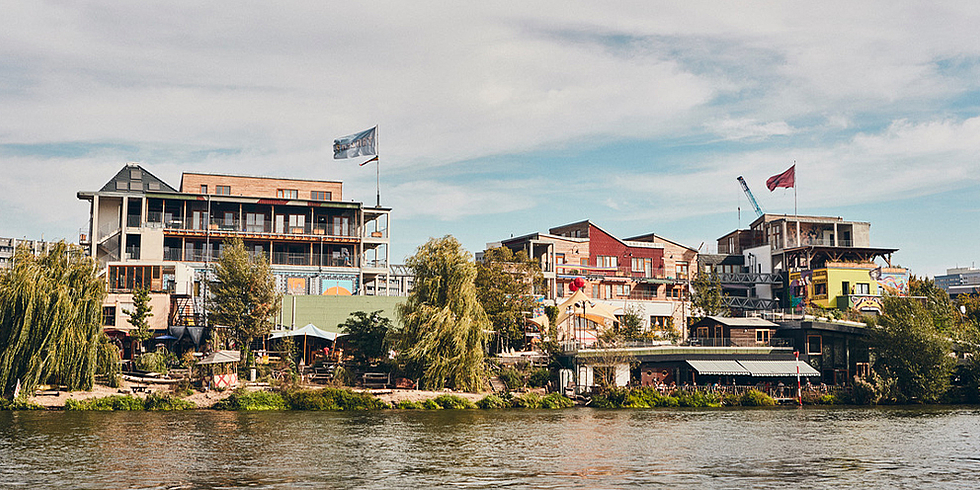DeepDive #19: Berlin as a hotspot for socio-ecological innovations
Berlin's most colourful neighbourhood, theHolzmarkt(Timber Market), is an urban development in the Holzmarktstrasse on the banks of the Spree, opposite the Ostbahnhof train station, that was opened in 2017. Here children attend music lessons at the Berliner Stadtmusikanten Music School, while artists rehearse in their studios next door. Some like to indulge in the culinary delights of the Katerschmaus restaurant, while others prefer to watch the sunset on the river banks. “With the Holzmarkt 25 project, our goal is first and foremost to design a place primarily for the common good of the community, not for profit maximization. That is why we have decided against a large part of the potential development opportunities here on the banks of the Spree and instead created a waterfront, which has been extensively renatured and is dedicated to the public," says Konstantin Krex from Holzmarkt 25, explaining the benefits for the city and its citizens. "Most of the buildings in Holzmarkt now provide space for art and culture - without displacement pressure and precarious working conditions.” But the 18,000 m2 space offers much more than just entertainment: with a restaurant, bakery, pastry shop, brewery, the urban organic garden Mörchenpark, a hairdresser, traders, craftsmen and a day care centre, the village offers something for everyone. “We try to establish a good mix of all areas and place emphasis on synergies in the district,” says Krex. “That means, the bakery delivers bread to the restaurant, the artists who train in our hall make appearances on our stage, the musicians who produce their music in our studios perform in the club on weekends, etc."
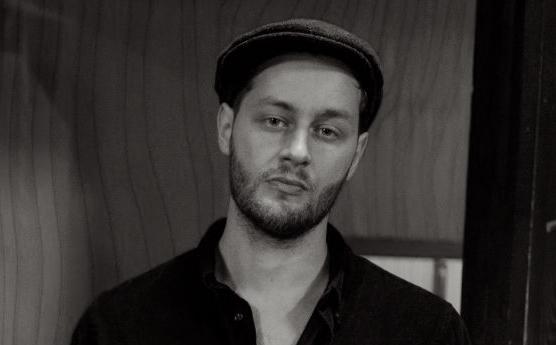
The Holzmarkt employs almost 200 people full time. Their salaries, the lease for the property and the cooperative financing are all generated from income received. “A large part also goes into fees for artists and the maintenance of public open and green spaces, which make up more than half of our property,” adds Krex. “So the money does not flow away, but instead finances the project idea and the people who make it possible, in accordance with the articles of association of our cooperative.” It is a model that has proven its worth during the coronavirus pandemic: “Thanks to the solidarity financing partners in the cooperative and our partners such as the Umweltbank – and of course also the aid provided by the Senate and the federal government - we managed to keep all employees," says Krex. "We were able to stick to the idea of using the place primarily for culture, and thanks to the many outdoor areas on our site, we have largely succeeded in creating something of community.” For 2021, he hopes that: “Concerts, theatre and maybe even a club night will once again be possible” at Holzmarkt. After the pandemic, Berlin must once again become a place once where people from all over the world visit to get inspiration or to realise their own projects. “To do this, we need a culture of enabling at all levels,” he says. "Especially within the government." Not 'no, because', but a 'yes, if' culture, according to urban researcher Charles Landry. And most importantly: We need spaces for dreams!
Framework conditions and economic development
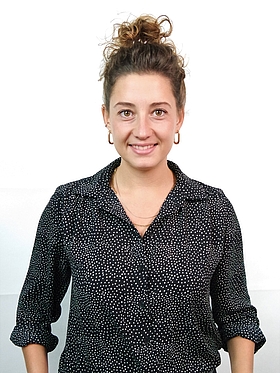
With this demand for a “culture of enabling”, the Holzmarkt cooperative found open ears at the Berlin Senate Department for Economics, Energy and Enterprises (SenWEB). As early as October 2018, the economic development programmes managed by the Investitionsbank Berlin (IBB) began to adapt to support companies in the social economy of Berlin. Since then, companies that operate to pursue common good objectives and focus on values such as solidarity and cooperation as well as sustainable management have been able to benefit from the funding programmes. From 1 July 2021, they can also take advantage of the Coaching BONUS funding programme to develop in-house skills. At the same time, the development bank is contributing € 1 million to the new European Social Innovation and Impact Fund (ESIIF). IBB is also currently preparing to launch its own Impact VC Fund for Social Entrepreneurs with a volume of € 30 million. The new venture capital fund is managed by IBB Ventures (formerly IBB Beteiligungsgesellschaft mbH) and is aimed specifically at social entrepreneurs whose companies make a positive, measurable contribution to achieving the UN's Sustainable Development Goals. The fund is expected to be launched at the end of 2021.
The launch of the funding programmes is only a first, important step: "There is still a lack of funding programmes and financing services that are adapted to the needs and reality of the founders," argues Afra Gloria Müller from the advocacy groupSEND (SocialEntrepreneur Netzwerk Deutschland), which campaigns for better framework conditions for social enterprises and their around 750 members. The social enterprises also need easier market access, for example through the public sector, which could specifically align procurement procedures according to socio-ecological criteria. Social enterprises also need more spaces and incubators for working and networking. Spaces like Impact Hub Berlin, which is shaping the future as a home for many social entrepreneurs, and the incubators FeedingtheCity, supported by the Bank of America, and BetterTogether, funded as part of the third round of the Berliner Startup Stipendiums (BSS) with funds from SenWEB and from the European Social Fund (ESF), demonstrate how sustainable companies are given targeted support in developing their business ideas. Soulincubator, a programme initiated by the Berlin social enterprise Soulbottle GmbH, also supports young innovators in putting their solutions for a plastic-free planet into practice, by serving as a project sponsor within the BSS framework. The need for such offers for new founders in the social economy is great, says Müller. "The range of consulting services for founders and, in particular, the scaling of social entrepreneurship should be expanded," adds the expert. "So far, there has been a lack of adequate infrastructure as well as the right political support. All of that should now change with the recently launched Social Economy Berlin project."
Social Economy Berlin makes Berlin a hotspot
Founded in September 2020, the Social Economy Berlin platform has big plans: The joint project by SEND (supported by SenWEB) and Technologie-Netzwerk Berlin e.V. aims to strengthen and increase the visibility of companies with impact in Berlin. “We want to advance the social economy in Berlin. It offers great potential to promote the sustainable and ecological transformation of the economy with innovative strength," says Ramona Pop, Senator for Economic Affairs. "This sees Berlin play a pioneering role in promoting the social economy."
Social economy is no longer a niche topic in the German capital. According to a study by the IBB, around 8,500 of the current 180,000 companies situated in Berlin are social enterprises. They employ around 185,000 people who are subject to social security contributions, accounting for 14 per cent of all employees in Berlin. With a total revenue of € 7 billion, they generate around 5.8 per cent of Berlin's economic output. Like the urban quarter on the Spree, they pursue common good objectives with their economic activities and place emphasis on values such as solidarity and cooperation as well as sustainable business practices. Instead of profit maximisation or growth, they want to show that a focus on the common good and profitability are not conflicting concepts. Their business models aim to provide social and sustainable solutions to current societal challenges. But that is not the only thing these enterprises have in common: diversity in companies in the social economy is also impressive.
The colourful world of social economy
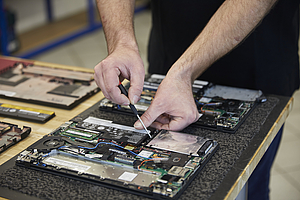
AfB - socialandgreen IT, Europe's largest non-profit IT company, has been successfully combining ecological and social sustainability under one roof for many years. "We specialize in data deletion, refurbishment and resale of used company hardware," says AfB managing director Daniel Büchle, summing up the company concept in a nutshell. "Our business model is based on long-term partnerships with over 1,000 companies such as Siemens, Otto, SWR and bertrandt, who sell the devices they no longer need to us." AfB resells around 70 per cent of the devices acquired; the other devices are dismantled by hand and professionally recycled. In this way, AfB is helping its partner companies to become more sustainable. According to an independent life cycle assessment study by the climate protection organisation myclimate, this saved 43,2000 tonnes of CO2 last year. It also saved 300 million litres of water, 170,400 MWH of energy and 24,700 tons of raw materials compared to new production. In addition, the partners benefit from guaranteed security of their company data as well as fulfilling their socio-ecological commitments, because AfB's stands for “jobs for people with disabilities”: All process steps are barrier-free, because at AfB employees with and without disabilities work hand in hand. "In our company, inclusion is not an exception, but the norm: 45 per cent of our 500 employees across Europe are severely disabled,"says company spokesperson Sina Grimm. "In the long term, we want to create 500 jobs for people with disabilities - we currently have around 230. So we are well on the way.” The IT refurbisher was awarded the German Sustainability Award in 2012 and again in 2021, a reflection of its success.
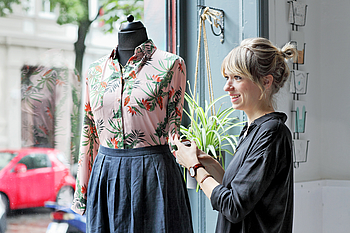
Christina Wille is on a similarly positive track. Following an internship in the Detox campaign by the NGO Greenpeace and her tenure as a store manager at Deargoods, the innovator who has made Berlin her home, founded her own company, which is now changing the "second dirtiest industry in the world" - the textile industry - for the better: In 2014, she opened the first Loveco shop in Berlin-Friedrichshain. The online shop followed in 2016 and a vegan footwear shop in Berlin-Kreuzberg in 2017. A third Loveco shop opened in Berlin-Schöneberg in September 2018 as another concept store for vegan fashion. “Our concept is based on three pillars: eco, fair and vegan. Our clothing protects the environment, people and animals. These three aspects are important to us and, in our opinion, belong together." We only sell fashion made from materials that are durable, ecological and easy to care for,” explains the founder and managing director of the social enterprise, who was named Berlin Entrepreneur of the Year in 2020. Wille ensures that the over 60 labels from all over Europe meet their strict criteria by first visiting the potential suppliers' production site before placing any orders. The entrepreneur and her team of 20 place emphasis on sustainability not just for their goods: The common good-oriented company's website states that it strives to "make society fair". Loveco is therefore actively committed to animal and environmental protection, but also humane working conditions along the entire value chain of the products sold. In addition, Loveco sends its online orders in recycled cardboard boxes via climate-neutral shipping with DHL Go Green. The shops are furnished with upcycled or second-hand furniture, electricity is supplied by the green electricity provider Polarstern Energie and the finances are managed by the social community bank GLS Bank.
Social economy: Working with like-minded people
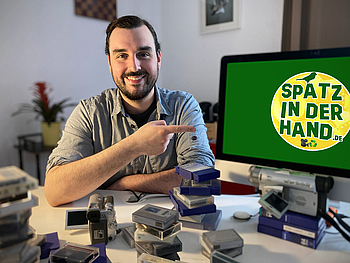
Companies in the social economy rely on like-minded people not only when choosing partners. Since 2010, the sustainable media company Sinnwerkstatt has been supporting responsible companies in effective media communication of their socio-ecological activities and projects. The team headed by managing director and co-founder Ian Delù has already launched successful campaigns for Noah –Italian vegan shoes, the sustainable search engine Ecosia, WWF, Start Green and the social enterprise Quartiermeister - Bier für den Kiez. Marc Tort Bielefeld with his one-man company SpatzInDerHand.de, on the other hand, has focused on one medium for placing messages from social enterprises in the spotlight: Since 2017, he has been producing sustainable advertising films. Instead of shooting (resource) costly and climate-damaging videos, he uses readily available material for his advertising films: “I got the idea for Spatz from working in a big post-production company,” says the entrepreneur. "In many advertising film productions, several agencies usually pitch for an order and produce 'mood films' just for this purpose. These depict the concept audiovisually, but consist of material that cannot be licensed (as is the case for feature films or other commercials) and can only be used for internal purposes. If an agency wins the pitch, the mood is often re-filmed shot by shot and often still does not achieve the quality of the original.” Marc Tort Bielefeld, on the other hand, saves himself the need to shoot and instead uses mood material such as stock footage that is available for use beyond internal purposes. "This eliminates many other work steps, and avoids the associated environmental impact. And the customers get exactly the film they want," he adds. In the meantime, the resourceful Berliner has developed film techniques to make elaborate film shoots completely obsolete. “In the best case scenario, I will use existing material from my customers,” says the founder. “But I also have a stock archive. Recently I've also been working on ways in which customers can become camera women and men themselves - with a smartphone, almost everyone has a suitable camera to hand. So I like to use this existing resource for my projects.” These include films for the platform Go Volunteer, which brings together social projects and volunteers, and the KK Stiftung, which supports families and education."Since 2020, I have actually only been working with customers whose values I share," says Tort Bielefeld. "This is a big milestone for me! At the moment, I'm working on a video for AfB."
Platform for Berlin's social economy
It is not known whether the sustainable video producer and the IT refurbisher have met through SEND. For Marc Tort Bielefeld, being a member of the network is definitely a good way to link up with other social entrepreneurs. Another network for social entrepreneurs is the project Social Economy, which also includes politics, administration, science and civil society. "In addition to setting up this network, we have also been able to hold a number of events since the start of the project in summer 2020, including the Social Economy Berlin Conference with over 500 guests. Due to the pandemic, almost all our activities so far have been exclusively online," reports Afra Gloria Müller, project manager of Social Economy Berlin. Further networking meetings and trade workshops for the community and interested parties are planned. “We also offer (pre-) start-up advice that founders can take advantage of free of charge. In addition, we are planning to offer a basic seminar this year for traditional consultants who should/want to support social entrepreneurs in setting up their own business in the future." The project is currently expected to only run until the end of 2021, but Müller hopes that the support structure will be sustained and that the services will remain in place so that Berlin can build on its “position as a hotspot for social enterprises in the EU”.
In the Deep Dive series, Projekt Zukunft gives regular insights into current technologies in the digital, media and creative sectors and provides information about actors, trends and applications from Berlin.
Contact
Christopher Hohage
Medienwirtschaft, Medientechnologie, Games, Film- und Fernsehwirtschaft

